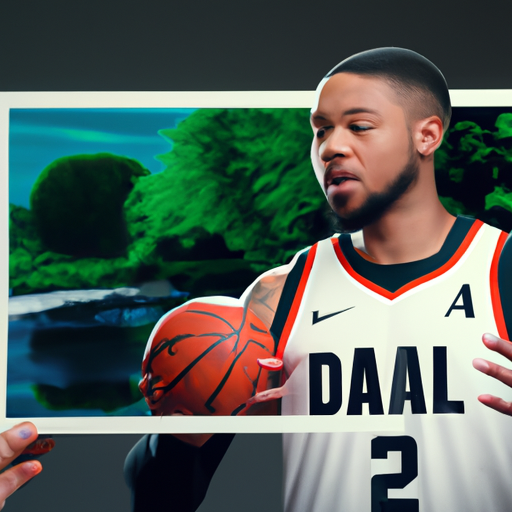Damian Lillard dismisses liking tweet that suggests Jody Allen to sell Blazers

The Impact of Social Media on Professional Athletes’ Public Image
Social media has become an integral part of our lives, allowing us to connect with others, share our thoughts and opinions, and stay updated on the latest news and trends. However, for professional athletes, social media can be a double-edged sword, as it can both enhance and tarnish their public image. Recently, Portland Trail Blazers’ star Damian Lillard found himself in the midst of a social media controversy when he liked a tweet suggesting that team owner Jody Allen should sell the Blazers. This incident highlights the impact of social media on professional athletes’ public image.
In today’s digital age, athletes are more accessible than ever before. Social media platforms such as Twitter, Instagram, and Facebook provide a direct line of communication between athletes and their fans. This can be a great opportunity for athletes to engage with their supporters, share their personal stories, and build a loyal fan base. However, it also means that every action they take on social media is scrutinized by the public.
Damian Lillard, known for his skills on the basketball court and his strong leadership qualities, has always been careful about his public image. He understands the power of social media and the potential consequences of his actions. Therefore, when he liked a tweet suggesting that Jody Allen should sell the Blazers, it raised eyebrows and sparked a debate among fans and media alike.
Lillard quickly took to social media to clarify his position. He stated that he liked the tweet by accident and that he has no intention of disrespecting the team’s owner or suggesting that she should sell the franchise. This incident serves as a reminder that even the smallest actions on social media can have significant repercussions.
The impact of social media on professional athletes’ public image cannot be underestimated. One wrong move, one ill-advised tweet, or one controversial like can quickly go viral and damage an athlete’s reputation. In today’s hyperconnected world, where news spreads like wildfire, athletes must be cautious about what they post and how they interact with others on social media.
However, it is not all doom and gloom. Social media also provides athletes with a platform to showcase their philanthropic efforts, promote their personal brands, and connect with fans on a more personal level. Many athletes use social media to share their training routines, behind-the-scenes moments, and insights into their lives. This helps humanize them and create a stronger bond with their supporters.
In the case of Damian Lillard, his quick response to the controversy and his transparent explanation helped mitigate the damage to his public image. Fans and media appreciated his honesty and accepted his explanation. This incident serves as a valuable lesson for athletes to be proactive in managing their social media presence and addressing any controversies that may arise.
In conclusion, social media has a profound impact on professional athletes’ public image. It can be a powerful tool for building a personal brand, connecting with fans, and showcasing philanthropic efforts. However, it also poses risks, as one wrong move can quickly tarnish an athlete’s reputation. The recent incident involving Damian Lillard liking a tweet suggesting that Jody Allen should sell the Blazers serves as a reminder of the importance of being cautious and proactive in managing one’s social media presence. Athletes must understand the power of social media and the potential consequences of their actions, as their public image is at stake.
The Role of Ownership in the Success of Sports Franchises

Damian Lillard, the star point guard for the Portland Trail Blazers, recently found himself at the center of controversy when he liked a tweet that suggested team owner Jody Allen should sell the franchise. This incident has sparked a larger conversation about the role of ownership in the success of sports franchises.
Ownership plays a crucial role in the success of sports franchises. Owners are responsible for making key decisions that can shape the direction of a team. They have the power to hire and fire coaches, sign players, and set the overall vision and strategy for the organization. A strong and committed owner can provide stability and resources that are essential for a team’s success.
In the case of the Portland Trail Blazers, Jody Allen took over as the team’s owner following the death of her brother, Paul Allen, who had been the owner for many years. Paul Allen was widely regarded as a passionate and dedicated owner who was deeply invested in the success of the team. His commitment to the Blazers was evident in his willingness to spend money on player salaries and facilities, as well as his involvement in community initiatives.
However, since Jody Allen took over as owner, there have been concerns among fans and players about her level of commitment to the team. The tweet that Damian Lillard liked suggested that Allen should sell the team because of her perceived lack of involvement and investment. While Lillard has since clarified that he did not mean to endorse the idea of selling the team, his action has brought attention to the issue.
It is not uncommon for sports franchises to face challenges when ownership changes hands. New owners may have different priorities or strategies that can impact the team’s success. In some cases, owners may be more focused on financial gains rather than the on-field performance of the team. This can lead to a lack of investment in player acquisitions or facilities, which can ultimately hinder a team’s ability to compete.
On the other hand, a committed and passionate owner can be a driving force behind a team’s success. Owners who are willing to invest in top-tier talent, provide state-of-the-art facilities, and engage with the community can create a positive environment that attracts players and fans alike. This level of commitment can also inspire players to give their best on the court, knowing that they have the support of ownership.
In the case of the Portland Trail Blazers, it remains to be seen how Jody Allen’s ownership will impact the team’s future. While there have been concerns raised about her level of involvement, it is important to remember that ownership is a complex and multifaceted role. It is possible that Allen is taking a more behind-the-scenes approach, focusing on building a strong front office and supporting the team in other ways.
Ultimately, the success of a sports franchise is a collective effort that involves players, coaches, front office staff, and ownership. While ownership plays a significant role in shaping the direction of a team, it is important to consider the broader context and the various factors that contribute to a team’s success. Only time will tell how the situation with the Portland Trail Blazers will unfold, but it serves as a reminder of the importance of strong and committed ownership in the world of sports.
The Challenges of Balancing Personal Opinions with Professional Responsibilities in the Sports Industry
Damian Lillard, the star point guard for the Portland Trail Blazers, recently found himself in the midst of controversy when he liked a tweet that suggested team owner Jody Allen should sell the franchise. This incident raises an important question about the challenges of balancing personal opinions with professional responsibilities in the sports industry.
In today’s hyperconnected world, athletes and other public figures are constantly under scrutiny for their actions both on and off the field. Social media platforms have given them a direct line of communication with their fans, but they also come with their fair share of pitfalls. Lillard’s case is a prime example of how a simple action like liking a tweet can quickly escalate into a major controversy.
As a professional athlete, Lillard is not just a player on the court; he is also a representative of the team and the organization as a whole. His actions and words carry weight and can have a significant impact on the team’s image and reputation. This is why many athletes are advised to be cautious about what they say or do on social media.
However, it is important to remember that athletes, like any other individuals, have their own personal opinions and beliefs. They are entitled to express themselves and engage in discussions about various topics. The challenge lies in finding the right balance between exercising their freedom of speech and maintaining a professional image.
In Lillard’s case, liking the tweet that suggested the team owner should sell the Blazers can be seen as a personal opinion. It is not uncommon for fans to express their frustrations or dissatisfaction with team ownership, and Lillard, as a player, is not immune to these sentiments. However, as a professional athlete, he must also consider the potential consequences of his actions.
The sports industry is a business, and team owners invest significant amounts of money and resources into their franchises. They have the right to make decisions about the direction of the team, including whether or not to sell it. Lillard’s actions, even if they were just a simple like on social media, can be interpreted as undermining the authority of the team owner and potentially damaging the team’s relationship with its owner.
This incident highlights the delicate balance that athletes must strike between their personal opinions and their professional responsibilities. While they have the right to express themselves, they must also be mindful of the impact their actions can have on their team, their organization, and their own careers.
In the aftermath of the controversy, Lillard took to social media to clarify his position. He stated that he did not intend to suggest that the team should be sold, but rather that he was expressing his frustration with the team’s performance. This clarification shows that Lillard understands the importance of addressing the issue and taking responsibility for his actions.
Ultimately, the challenges of balancing personal opinions with professional responsibilities in the sports industry are not unique to Damian Lillard or any other athlete. They are inherent to the nature of the profession. Athletes must navigate the fine line between expressing themselves and maintaining a professional image, all while being mindful of the impact their actions can have on their team and their own careers.
As fans, it is important to remember that athletes are human beings with their own thoughts and feelings. While we may not always agree with their opinions or actions, it is crucial to approach these situations with empathy and understanding. The sports industry is a complex and multifaceted world, and finding the right balance between personal expression and professional responsibility is an ongoing challenge for all involved.

